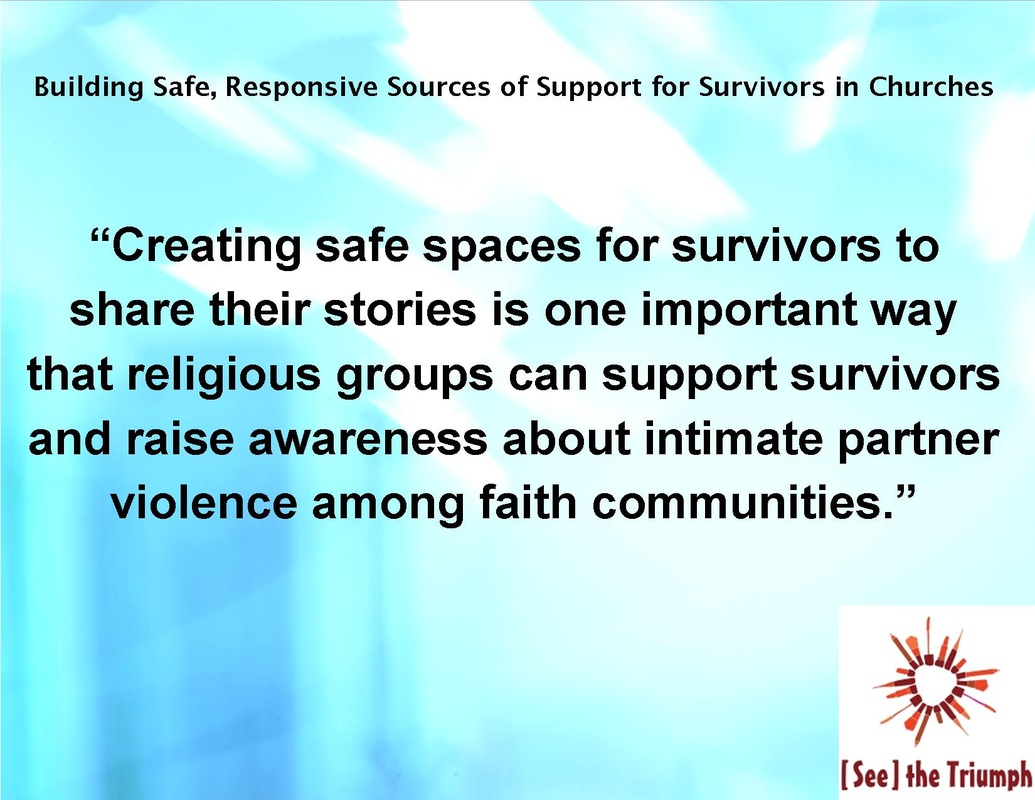|
By Christine Murray, See the Triumph Co-Founder
This month, we’ve been focusing on ways that churches can help to challenge the stigma surrounding intimate partner violence, and especially the stigma the survivors may face from within their faith communities. One idea that we heard on how faith communities could do this is by providing a forum for survivors to share their stories. As we’ve discussed before, the choice for whether survivors want to tell their stories should always be completely up to them. Sharing one’s story can be very powerful, but it can also bring potential safety risks. Also, a survivor who shares his or her story may face harmful reactions from others, such as disbelief, blame, and a general lack of support or validation. If a survivor feels safe to share his or her story within a church setting--whether that is with a full congregation or with smaller groups within the church--this can provide a very powerful opportunity for both the survivor and the other members of the faith community. The survivor may feel empowered by the opportunity to inspire and educate others through their experiences. In turn, community members can learn from the survivor, thereby becoming more aware of the dynamics of intimate partner violence and the needs that other survivors may face. I think we can learn from the experiences of some of the survivors in our research on how best to set up these speaking opportunities in a way that is safe for the survivor and educational for the community. To that end, I offer the following three suggestions: 1. When possible, work in conjunction with local domestic violence agencies. One survivor said, “On three occasions in large faith-based group settings, I've shared my story as a survivor speaker for a community agency that advocates for DV victims and their families. The reaction of most have been compassionate and empathetic.” Having the involvement of local professionals is useful for at least two reasons. First, professionals can supplement the information provided by survivors by offering local resources and information about the common dynamics involved in domestic violence cases. Second, hearing a story of one person’s abuse can prompt others in a group to disclose their own abuse histories. A professional can therefore help to respond to these new disclosures and direct these people to appropriate community resources as needed. 2. Respond to the survivor’s story with empathy and support. Even survivors who are comfortable sharing their stories can be very sensitive to negative responses from others. For example, one survivor in our research said that, after she shared her story, people “responded in silence through actions, facial expressions as if to say ‘why is she sharing her dirty laundry?’ This collection of folks find ways to avoid eye contact when our paths have crossed again.” Such a response can add to the stigma surrounding abuse for the speaker. In addition to the speaker, this can be hurtful to other survivors in the audience. Although it’s not possible to control how every single person will respond to a survivor’s story in a public or group setting, church leaders can be vocal in expressing a validating and supportive response and thereby set the tone for the other community members’ responses. 3. Encourage church members to keep an open mind to hearing ideas and experiences that are different from their own. One of our research participants said, “You have an uphill battle to end stigmatization in fundamentalist faith communities because very often they are resistant to hearing anything that contradicts their paradigms.” Of course, every faith community will hold true to its religious beliefs and values, and that’s an important part of what unites that community. At the same time, sometimes difficult experiences, such as abuse, do not fit neatly into religious belief systems. Furthermore, as we explored in a previous post, sometimes religious values and beliefs are applied in ways that add to the stigma surrounding abuse and increase the safety risks for survivors. Therefore, an openness to hearing difficult stories and considering how religious beliefs intersect with those stories can help congregations begin to really challenge the stigma surrounding abuse. I’ve personally spoken with church groups about domestic violence, and most often I have found them to be very concerned about this issue and wanting to help support survivors however they can. I believe that creating safe spaces for survivors to share their stories is one important way that religious groups can support survivors and raise awareness about intimate partner violence among faith communities. Share your ideas with us, too! What do you think are the barriers to creating safe places for survivors to share their stories in faith communities? What ideas do you have for creating more of these opportunities in your own faith community? Comments are closed.
|
Archives
July 2024
CategoriesAll About Intimate Partner Violence About Intimate Partner Violence Advocacy Ambassadors Children Churches College Campuses Cultural Issues Domestic Violence Awareness Month Financial Recovery How To Help A Friend Human Rights Human-rights Immigrants International Media Overcoming Past Abuse Overcoming-past-abuse Parenting Prevention Resources For Survivors Safe Relationships Following Abuse Schools Selfcare Self-care Sexual Assault Sexuality Social Justice Social-justice Stigma Supporting Survivors Survivor Quotes Survivor-quotes Survivor Stories Teen Dating Violence Trafficking Transformative-approaches |
Search by typing & pressing enter



 RSS Feed
RSS Feed